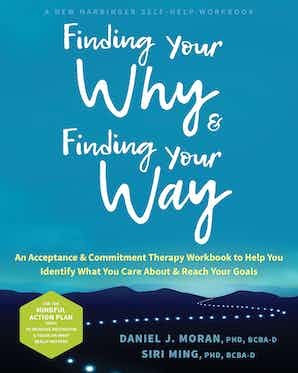To be released in January:

 www.newharbinger.com
www.newharbinger.com

by Daniel J. Moran and Siri Ming
Put mindfulness into action, and create a “map” for your chosen life path with this powerful, step-by-step workbook.
Do you feel “stuck” in your life right now? You aren’t alone. Whether you struggle with depression, anxiety, trauma—or simply feel unhappy or unmotivated—you may be seeking ways to find meaning, or discover the inspiration you need to create a new path in life that better serves you. Mindfulness has gained popularity as a self-help solution for a variety of mental health issues, and mindfulness meditation has been touted as powerfully effective in helping people find focus and balance in order to complete important tasks. But if you’re like many other people, you may wonder, “How does one actually do mindfulness?”
This is an accessible, step-by-step guide for putting mindfulness into action every day. You’ll find an evidence-based and customizable approach that blends mindfulness, behavioral activation skills, performance management techniques, and acceptance and commitment therapy (ACT) to help you identify what you deeply care about; increase your motivation; get unstuck from anxiety, depression, or trauma; reach your goals; and ultimately live a more meaningful life. You will also learn to develop personal growth skills, and take committed action to create positive change.
If you’re ready to break free from the invisible barriers that stand between you and true happiness and satisfaction, this practical mindfulness guide will help you create your own path that leads to a more intentional and vital life!

Finding Your Why and Finding Your Way
Put mindfulness into action, and create a “map” for your chosen life path with this powerful, step-by-step workbook. Do you feel “stuck” in your life...

by Daniel J. Moran and Siri Ming
Put mindfulness into action, and create a “map” for your chosen life path with this powerful, step-by-step workbook.
Do you feel “stuck” in your life right now? You aren’t alone. Whether you struggle with depression, anxiety, trauma—or simply feel unhappy or unmotivated—you may be seeking ways to find meaning, or discover the inspiration you need to create a new path in life that better serves you. Mindfulness has gained popularity as a self-help solution for a variety of mental health issues, and mindfulness meditation has been touted as powerfully effective in helping people find focus and balance in order to complete important tasks. But if you’re like many other people, you may wonder, “How does one actually do mindfulness?”
This is an accessible, step-by-step guide for putting mindfulness into action every day. You’ll find an evidence-based and customizable approach that blends mindfulness, behavioral activation skills, performance management techniques, and acceptance and commitment therapy (ACT) to help you identify what you deeply care about; increase your motivation; get unstuck from anxiety, depression, or trauma; reach your goals; and ultimately live a more meaningful life. You will also learn to develop personal growth skills, and take committed action to create positive change.
If you’re ready to break free from the invisible barriers that stand between you and true happiness and satisfaction, this practical mindfulness guide will help you create your own path that leads to a more intentional and vital life!
